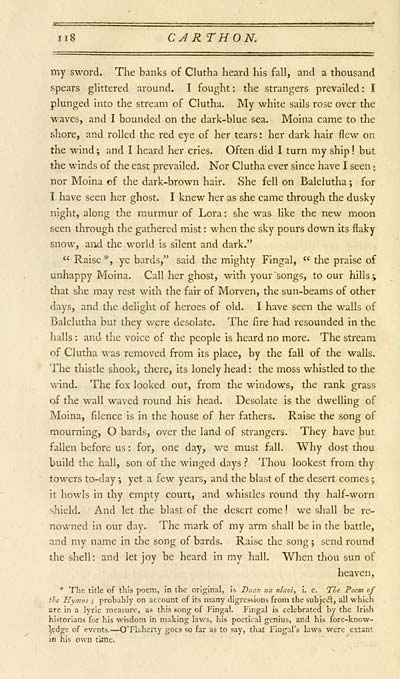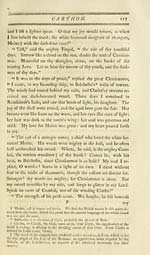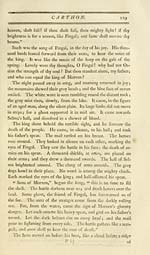Download files
Complete book:
Individual page:
Thumbnail gallery: Grid view | List view

ii8 CART HON.
my sword. The banks of Clutha heard his fall, and a thousand
spears glittered around. I fought : the strangers prevailed : I
plunged into the stream of Clutha. My white sails rose over the
waves, and I bounded on the dark-blue sea. Moina came to the
shore, and rolled the red eye of her tears : her dark hair flew on
the wind ; and I heard her cries. Often did I turn my ship ! but
the winds of the east prevailed. Nor Clutha ever since have I seen :
nor Moina of the dark-brown hair. She fell on Balclutha ; for
I have seen her ghost. I knew her as she came through the dusky
night, along the murmur of Lora : she was like the new moon
seen through the gathered mist : when the sky pours down its flaky
snow, aiid the world is silent and dark."
" Raise *, ye bards," said the mighty Fingal, " the praise of
unhappy Moina. Call her ghost, with your songs, to our hills-,
that she may rest with the fair of Morven, the sun-beams of other
days, and the delight of heroes of old. I have seen the walls of
Balclutha but they were desolate. The fire had resounded in the
halls : and the voice of the people is heard no more. The stream
of Clutha was removed from its place, by the fall of the walls.
The thistle shook, there, its lonely head : the moss whistled to the
wind. The fox looked out, from the windows, the rank grass
of the wall waved round his head. Desolate is the dwelling of
Moina, filence is in the house of her fathers. Raise the song of
mourning, O bards, over the land of strangers. They have but
fallen before us : for, one day, we must fall. Why dost thou
build the hall, son of the winged days ? Thou lookest from thy
towers to-day ; yet a few years, and the blast of the desert comes ;
it howls in thy empty court, and whistles round thy half- worn
shield. And let the blast of the desert come ! we shall be re-
nowned in our day. The mark of my arm shall be in the battle,
and my name in the song of bards. Raise the song ; send round
the shell: and let joy be heard in my hall. When thou sun of
heaven,
* The title of this poem, in the original, is Diu7r na nlao'i, i. c. Hhe Poem of
He Hymns ; probably on account of its many digressions from the subje<fl, all which
are in a lyric measure, as this song of Fingal. Fingal is celebrated by the Irish
historians for his wisdom in making laws, his poetical genius, and his fore-know-
\cdge of events. — O'Flaherty goes so far as to say, that Fingal's laws were extant
in his own tkne.
my sword. The banks of Clutha heard his fall, and a thousand
spears glittered around. I fought : the strangers prevailed : I
plunged into the stream of Clutha. My white sails rose over the
waves, and I bounded on the dark-blue sea. Moina came to the
shore, and rolled the red eye of her tears : her dark hair flew on
the wind ; and I heard her cries. Often did I turn my ship ! but
the winds of the east prevailed. Nor Clutha ever since have I seen :
nor Moina of the dark-brown hair. She fell on Balclutha ; for
I have seen her ghost. I knew her as she came through the dusky
night, along the murmur of Lora : she was like the new moon
seen through the gathered mist : when the sky pours down its flaky
snow, aiid the world is silent and dark."
" Raise *, ye bards," said the mighty Fingal, " the praise of
unhappy Moina. Call her ghost, with your songs, to our hills-,
that she may rest with the fair of Morven, the sun-beams of other
days, and the delight of heroes of old. I have seen the walls of
Balclutha but they were desolate. The fire had resounded in the
halls : and the voice of the people is heard no more. The stream
of Clutha was removed from its place, by the fall of the walls.
The thistle shook, there, its lonely head : the moss whistled to the
wind. The fox looked out, from the windows, the rank grass
of the wall waved round his head. Desolate is the dwelling of
Moina, filence is in the house of her fathers. Raise the song of
mourning, O bards, over the land of strangers. They have but
fallen before us : for, one day, we must fall. Why dost thou
build the hall, son of the winged days ? Thou lookest from thy
towers to-day ; yet a few years, and the blast of the desert comes ;
it howls in thy empty court, and whistles round thy half- worn
shield. And let the blast of the desert come ! we shall be re-
nowned in our day. The mark of my arm shall be in the battle,
and my name in the song of bards. Raise the song ; send round
the shell: and let joy be heard in my hall. When thou sun of
heaven,
* The title of this poem, in the original, is Diu7r na nlao'i, i. c. Hhe Poem of
He Hymns ; probably on account of its many digressions from the subje<fl, all which
are in a lyric measure, as this song of Fingal. Fingal is celebrated by the Irish
historians for his wisdom in making laws, his poetical genius, and his fore-know-
\cdge of events. — O'Flaherty goes so far as to say, that Fingal's laws were extant
in his own tkne.
Set display mode to: Large image | Transcription
Images and transcriptions on this page, including medium image downloads, may be used under the Creative Commons Attribution 4.0 International Licence unless otherwise stated. ![]()
| Early Gaelic Book Collections > Ossian Collection > Poems of Ossian, the son of Fingal > (130) |
|---|
| Permanent URL | https://digital.nls.uk/77924085 |
|---|
| Description | Selected books from the Ossian Collection of 327 volumes, originally assembled by J. Norman Methven of Perth. Different editions and translations of James MacPherson's epic poem 'Ossian', some with a map of the 'Kingdom of Connor'. Also secondary material relating to Ossianic poetry and the Ossian controversy. |
|---|
| Description | Selected items from five 'Special and Named Printed Collections'. Includes books in Gaelic and other Celtic languages, works about the Gaels, their languages, literature, culture and history. |
|---|

